|
PLearn 0.1
|
|
PLearn 0.1
|
Command to start the PLearn Integrated Development Environment (PLIDE) More...
#include <Plide.h>
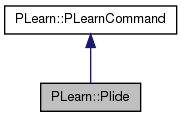
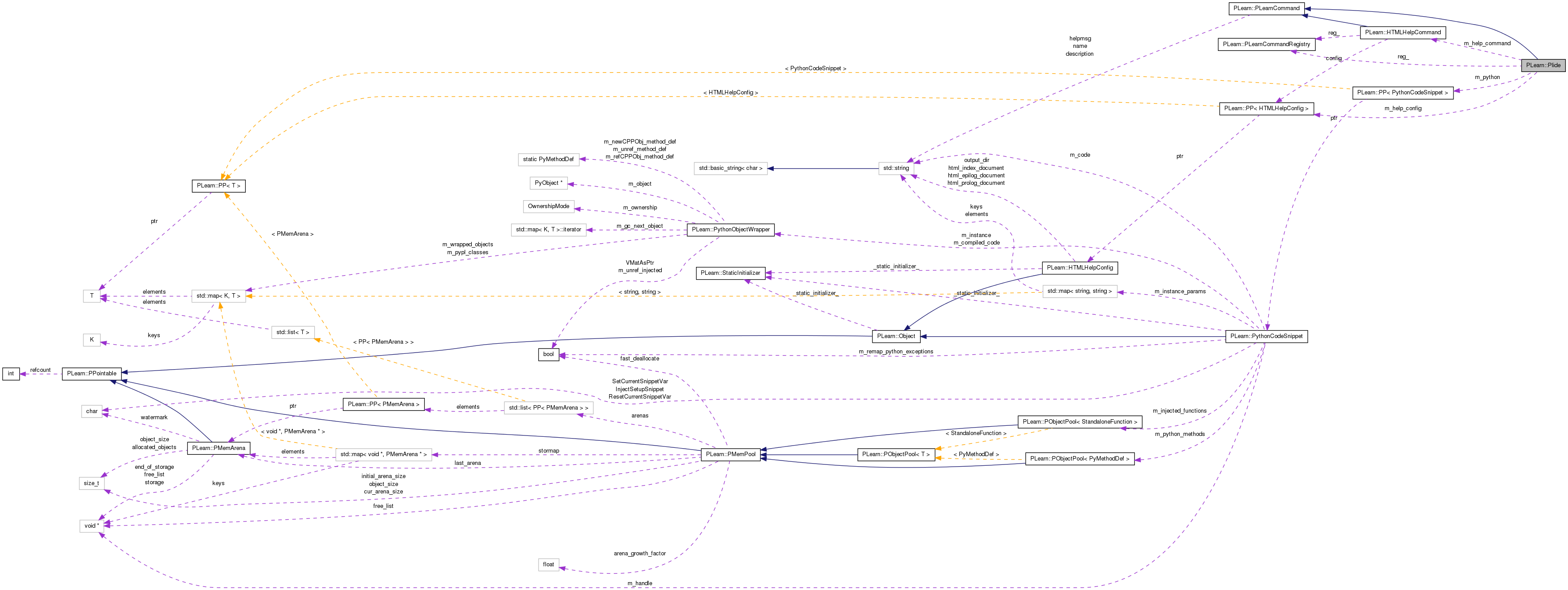
Public Member Functions | |
| Plide () | |
| virtual void | run (const std::vector< std::string > &args) |
| The actual implementation of the 'Plide' command. | |
| PythonObjectWrapper | versionString (const TVec< PythonObjectWrapper > &args) const |
| PLearn version string. | |
| PythonObjectWrapper | getAllClassnames (const TVec< PythonObjectWrapper > &args) const |
| List of classes registered for serialization (does not return abstract classes since the user may not instantiate them) | |
| PythonObjectWrapper | helpResourcesPath (const TVec< PythonObjectWrapper > &args) |
| Establish the directory in which elements for HTML help generation should be found. | |
| PythonObjectWrapper | helpIndex (const TVec< PythonObjectWrapper > &args) const |
| Return the help index as a string. | |
| PythonObjectWrapper | helpCommands (const TVec< PythonObjectWrapper > &args) const |
| Generate list of registered commands. | |
| PythonObjectWrapper | helpClasses (const TVec< PythonObjectWrapper > &args) const |
| Generate list of registered classes. | |
| PythonObjectWrapper | helpOnCommand (const TVec< PythonObjectWrapper > &args) const |
| Generate documentation for a given command. | |
| PythonObjectWrapper | helpOnClass (const TVec< PythonObjectWrapper > &args) const |
| Generate documentation for a given class. | |
| PythonObjectWrapper | setOptionLevel (const TVec< PythonObjectWrapper > &args) const |
| Option level for class help. | |
| PythonObjectWrapper | toggleOptionFlag (const TVec< PythonObjectWrapper > &args) const |
| Toggle flags to display for class help. | |
| PythonObjectWrapper | precisOnClass (const TVec< PythonObjectWrapper > &args) const |
| Generate the short (one-line) documentation for a given class, as well as the list of all BUILD options it supports. | |
| PythonObjectWrapper | loggingControl (const TVec< PythonObjectWrapper > &args) const |
| Logging control. | |
| void | executePyPLearn (const string &script_code, const string &root_dir) const |
| Execute .pyplearn script (given as a character string) using the specified directory as cwd. | |
Public Attributes | |
| PP< PythonCodeSnippet > | m_python |
| Make available the puthon snippet to supporting classes (e.g. | |
| HTMLHelpCommand * | m_help_command |
| HTML generator for the Help system (points to the systemwide command instance) | |
| PP< HTMLHelpConfig > | m_help_config |
| Configuration object for the HTML Help system. | |
Static Protected Attributes | |
| static PLearnCommandRegistry | reg_ |
| This allows to register the 'Plide' command in the command registry. | |
Private Types | |
| typedef PLearnCommand | inherited |
Command to start the PLearn Integrated Development Environment (PLIDE)
Upon running, this command starts up a graphical user interface to interface more easily with PLearn.
typedef PLearnCommand PLearn::Plide::inherited [private] |
| PLearn::Plide::Plide | ( | ) |
Definition at line 225 of file Plide.cc.
: PLearnCommand( "plide", "Starts up the PLearn Integrated Development Environment (PLIDE)", "Upon running, this command starts up a graphical user interface to\n" "interface more easily with PLearn.\n" ) { }
| void PLearn::Plide::executePyPLearn | ( | const string & | script_code, |
| const string & | root_dir | ||
| ) | const |
Execute .pyplearn script (given as a character string) using the specified directory as cwd.
Definition at line 493 of file Plide.cc.
References PLearn::chdir(), PLearn::PStream::good(), PLearn::openString(), PLASSERT, PLearn::PStream::plearn_ascii, PLearn::readObject(), and PLearn::PStream::skipBlanksAndCommentsAndSeparators().
Referenced by run().
{
PLearn::chdir(PPath(root_dir));
PStream pyplearn_in = openString(script_code, PStream::plearn_ascii);
PP<PyPLearnScript> pyplearn_script = new PyPLearnScript;
pyplearn_in >> pyplearn_script;
PLASSERT( pyplearn_script );
string pyplearn_script_string = pyplearn_script->getScript();
PStream plearn_in = openString(pyplearn_script_string,
PStream::plearn_ascii);
while (plearn_in.good()) {
PP<Object> o = readObject(plearn_in);
o->run();
plearn_in.skipBlanksAndCommentsAndSeparators();
}
// Save out experiment.plearn and metainfos.txt
pyplearn_script->close();
}
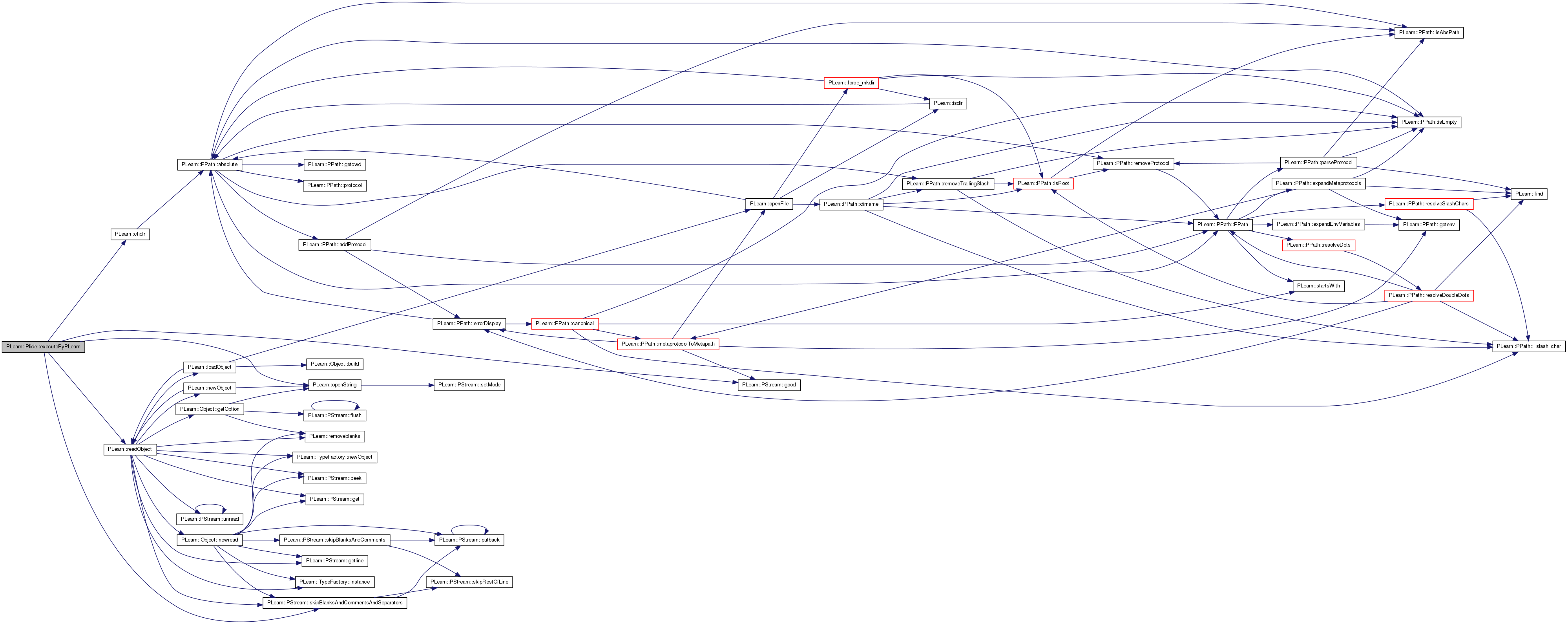

| PythonObjectWrapper PLearn::Plide::getAllClassnames | ( | const TVec< PythonObjectWrapper > & | args | ) | const |
List of classes registered for serialization (does not return abstract classes since the user may not instantiate them)
Definition at line 337 of file Plide.cc.
References PLearn::TypeFactory::getTypeMap(), PLearn::TypeFactory::instance(), PLERROR, PLearn::TVec< T >::push_back(), PLearn::TVec< T >::resize(), and PLearn::TVec< T >::size().
Referenced by run().
{
if (args.size() != 0)
PLERROR("%sExpecting 0 argument; got %d", __FUNCTION__, args.size());
const TypeMap& tm = TypeFactory::instance().getTypeMap();
TVec<string> all_classes;
all_classes.resize(0, tm.size());
for (TypeMap::const_iterator it = tm.begin(), end = tm.end()
; it != end ; ++it)
{
// Skip abstract classes
if (it->second.constructor)
all_classes.push_back(it->second.type_name);
}
return PythonObjectWrapper(all_classes);
}
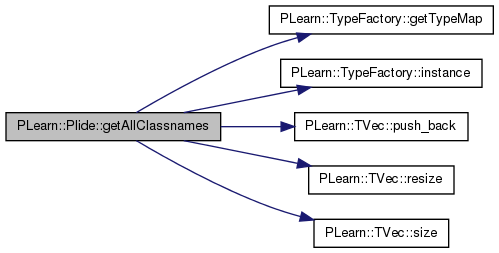

| PythonObjectWrapper PLearn::Plide::helpClasses | ( | const TVec< PythonObjectWrapper > & | args | ) | const |
Generate list of registered classes.
Definition at line 399 of file Plide.cc.
References PLearn::HTMLHelpCommand::helpClasses(), m_help_command, m_help_config, PLASSERT, PLERROR, and PLearn::TVec< T >::size().
Referenced by run().
{
if (args.size() != 0)
PLERROR("%sExpecting 0 argument; got %d", __FUNCTION__, args.size());
PLASSERT( m_help_config && m_help_command );
ostringstream os;
m_help_command->helpClasses(os, m_help_config);
return PythonObjectWrapper(os.str());
}


| PythonObjectWrapper PLearn::Plide::helpCommands | ( | const TVec< PythonObjectWrapper > & | args | ) | const |
Generate list of registered commands.
Definition at line 388 of file Plide.cc.
References PLearn::HTMLHelpCommand::helpCommands(), m_help_command, m_help_config, PLASSERT, PLERROR, and PLearn::TVec< T >::size().
Referenced by run().
{
if (args.size() != 0)
PLERROR("%sExpecting 0 argument; got %d", __FUNCTION__, args.size());
PLASSERT( m_help_config && m_help_command );
ostringstream os;
m_help_command->helpCommands(os, m_help_config);
return PythonObjectWrapper(os.str());
}


| PythonObjectWrapper PLearn::Plide::helpIndex | ( | const TVec< PythonObjectWrapper > & | args | ) | const |
Return the help index as a string.
Definition at line 377 of file Plide.cc.
References PLearn::HTMLHelpCommand::helpIndex(), m_help_command, m_help_config, PLASSERT, PLERROR, and PLearn::TVec< T >::size().
Referenced by run().
{
if (args.size() != 0)
PLERROR("%sExpecting 0 argument; got %d", __FUNCTION__, args.size());
PLASSERT( m_help_config && m_help_command );
ostringstream os;
m_help_command->helpIndex(os, m_help_config);
return PythonObjectWrapper(os.str());
}


| PythonObjectWrapper PLearn::Plide::helpOnClass | ( | const TVec< PythonObjectWrapper > & | args | ) | const |
Generate documentation for a given class.
Definition at line 421 of file Plide.cc.
References PLearn::HTMLHelpCommand::helpOnClass(), m_help_command, m_help_config, PLASSERT, PLERROR, and PLearn::TVec< T >::size().
Referenced by run().
{
if (args.size() != 1)
PLERROR("%sExpecting 1 argument; got %d", __FUNCTION__, args.size());
PLASSERT( m_help_config && m_help_command );
ostringstream os;
m_help_command->helpOnClass(args[0].as<string>(), os, m_help_config);
return PythonObjectWrapper(os.str());
}


| PythonObjectWrapper PLearn::Plide::helpOnCommand | ( | const TVec< PythonObjectWrapper > & | args | ) | const |
Generate documentation for a given command.
Definition at line 410 of file Plide.cc.
References PLearn::HTMLHelpCommand::helpOnCommand(), m_help_command, m_help_config, PLASSERT, PLERROR, and PLearn::TVec< T >::size().
Referenced by run().
{
if (args.size() != 1)
PLERROR("%sExpecting 1 argument; got %d", __FUNCTION__, args.size());
PLASSERT( m_help_config && m_help_command );
ostringstream os;
m_help_command->helpOnCommand(args[0].as<string>(), os, m_help_config);
return PythonObjectWrapper(os.str());
}


| PythonObjectWrapper PLearn::Plide::helpResourcesPath | ( | const TVec< PythonObjectWrapper > & | args | ) |
Establish the directory in which elements for HTML help generation should be found.
This comes from Python since it's relative to the location of the Plide Python code.
Definition at line 355 of file Plide.cc.
Referenced by run().
{
// DEPRECATED: see HelpSystem
/*
if (args.size() != 1)
PLERROR("%sExpecting 1 argument; got %d", __FUNCTION__, args.size());
PPath base_path = args[0].as<string>();
m_help_config = new HTMLHelpConfig;
m_help_config->html_index_document = "";
m_help_config->html_prolog_document = base_path / "help_prolog.html";
m_help_config->html_epilog_document = base_path / "help_epilog.html";
m_help_command = dynamic_cast<HTMLHelpCommand*>(
PLearnCommandRegistry::commands()["htmlhelp"]);
if (! m_help_command)
PLERROR("%sThe PLearn command 'HTMLHelpCommand' must be linked into "
"the executable in order to use the Plide help system.", __FUNCTION__);
*/
return PythonObjectWrapper();
}

| PythonObjectWrapper PLearn::Plide::loggingControl | ( | const TVec< PythonObjectWrapper > & | args | ) | const |
Logging control.
This function should be called with two arguments: 1) Desired verbosity level (integer) 2) List of module names to activate in named logging (list of strings)
Definition at line 478 of file Plide.cc.
References PLearn::PL_Log::enableNamedLogging(), PLearn::PL_Log::instance(), PLERROR, PLearn::TVec< T >::size(), and PLearn::PL_Log::verbosity().
Referenced by run().
{
if (args.size() != 2)
PLERROR("%sExpecting 2 arguments; got %d", __FUNCTION__, args.size());
int desired_verbosity = args[0].as<int>();
vector<string> module_names = args[1].as< vector<string> >();
PL_Log::instance().verbosity(desired_verbosity);
PL_Log::instance().enableNamedLogging(module_names);
return PythonObjectWrapper();
}


| PythonObjectWrapper PLearn::Plide::precisOnClass | ( | const TVec< PythonObjectWrapper > & | args | ) | const |
Generate the short (one-line) documentation for a given class, as well as the list of all BUILD options it supports.
This is returned as a pair (doc, options_list). Return None if no such class exists.
Definition at line 451 of file Plide.cc.
References PLearn::OptionBase::buildoption, PLearn::TypeMapEntry::getoptionlist_method, PLearn::TypeFactory::getTypeMapEntry(), PLearn::TypeFactory::instance(), PLearn::TypeFactory::isRegistered(), PLearn::TypeMapEntry::one_line_descr, PLERROR, PLearn::TVec< T >::push_back(), PLearn::TVec< T >::resize(), and PLearn::TVec< T >::size().
Referenced by run().
{
if (args.size() != 1)
PLERROR("%sExpecting 1 argument; got %d", __FUNCTION__, args.size());
string classname = args[0].as<string>();
if (TypeFactory::instance().isRegistered(classname)) {
const TypeMapEntry& tme = TypeFactory::instance().getTypeMapEntry(classname);
OptionList& options = (*tme.getoptionlist_method)();
TVec<string> build_options;
build_options.resize(0, options.size());
// Determine buildoptions
for (OptionList::iterator it=options.begin(), end=options.end()
; it != end ; ++it)
{
int flags = (*it)->flags();
if (flags & OptionBase::buildoption)
build_options.push_back((*it)->optionname());
}
return PythonObjectWrapper(make_pair(tme.one_line_descr, build_options));
}
else
return PythonObjectWrapper(); // None
}
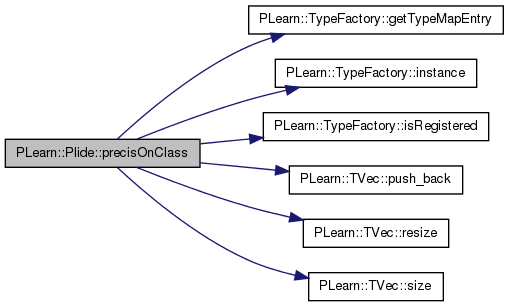

| void PLearn::Plide::run | ( | const std::vector< std::string > & | args | ) | [virtual] |
The actual implementation of the 'Plide' command.
Implements PLearn::PLearnCommand.
Definition at line 237 of file Plide.cc.
References PLearn::endl(), executePyPLearn(), getAllClassnames(), PLearn::PL_Log::getCurrentPlugin(), PLearn::ProgressBar::getCurrentPlugin(), helpClasses(), helpCommands(), helpIndex(), helpOnClass(), helpOnCommand(), helpResourcesPath(), PLearn::PL_Log::instance(), loggingControl(), m_python, PLearn::PLearnError::message(), PLearn::PL_Log::outmode(), PLERROR, PLearn::plide_code, precisOnClass(), PLearn::PStream::pretty_ascii, setOptionLevel(), PLearn::PL_Log::setPlugin(), PLearn::ProgressBar::setPlugin(), PLearn::TVec< T >::size(), toggleOptionFlag(), and versionString().
{
m_python = new PythonCodeSnippet(plide_code);
m_python->build();
// A bunch of injections
m_python->inject("versionString", this, &Plide::versionString);
m_python->inject("getAllClassnames", this, &Plide::getAllClassnames);
m_python->inject("helpResourcesPath", this, &Plide::helpResourcesPath);
m_python->inject("helpIndex", this, &Plide::helpIndex);
m_python->inject("helpCommands", this, &Plide::helpCommands);
m_python->inject("helpClasses", this, &Plide::helpClasses);
m_python->inject("helpOnCommand", this, &Plide::helpOnCommand);
m_python->inject("helpOnClass", this, &Plide::helpOnClass);
m_python->inject("setOptionLevel", this, &Plide::setOptionLevel);
m_python->inject("toggleOptionFlag", this, &Plide::toggleOptionFlag);
m_python->inject("precisOnClass", this, &Plide::precisOnClass);
m_python->inject("loggingControl", this, &Plide::loggingControl);
// Start the thing!
m_python->invoke("StartPlide", args);
// Link progress bar stuff to GUI elements
PP<ProgressBarPlugin> previous_progress_plugin = ProgressBar::getCurrentPlugin();
PP<ProgressBarPlugin> pp_ppp = new PlideProgressPlugin(m_python);
ProgressBar::setPlugin(pp_ppp);
// Link logging stuff to GUI elements; change stream mode to pretty ascii
PL_Log::instance().outmode(PStream::pretty_ascii);
PP<PL_LogPlugin> previous_log_plugin = PL_Log::instance().getCurrentPlugin();
PP<PL_LogPlugin> log_plugin = new PlideLogPlugin(m_python);
PL_Log::instance().setPlugin(log_plugin);
// Main loop: get work, dispatch, start again
while (true) {
TVec<string> work = m_python->invoke("GetWork").as< TVec<string> >();
if (work.size() != 4)
PLERROR("%sExpected to receive a work vector with 4 elements; got %d",
__FUNCTION__, work.size());
const string& request_id = work[0];
const string& script_code = work[1];
const string& root_dir = work[2];
const string& script_kind = work[3];
MODULE_LOG << "Got work request " << request_id
<< " in directory " << root_dir
<< " with script (subset):\n"
<< script_code.substr(0,100)
<< endl;
if (script_code == "Quit()")
break;
string result_code;
string result_details;
try {
if (script_kind == "pyplearn")
executePyPLearn(script_code, root_dir);
else
PLERROR("%sUnknown/unsupported script kind '%s'",
__FUNCTION__, script_kind.c_str());
}
catch (const PLearnError& e) {
result_code = "PLearnError";
result_details = e.message();
}
catch (const std::exception& e) {
result_code = "std::exception";
result_details = e.what();
}
catch (...)
{
result_code = "UnknownError";
result_details =
"uncaught unknown exception "
"(ex: out-of-memory when allocating a matrix)";
}
m_python->invoke("PostWorkResults", request_id, result_code, result_details);
}
// Finally, quit the GTK loop
m_python->invoke("QuitPlide");
// Bring back previous plugin before shutting down Python
PL_Log::instance().setPlugin(previous_log_plugin);
ProgressBar::setPlugin(previous_progress_plugin);
}
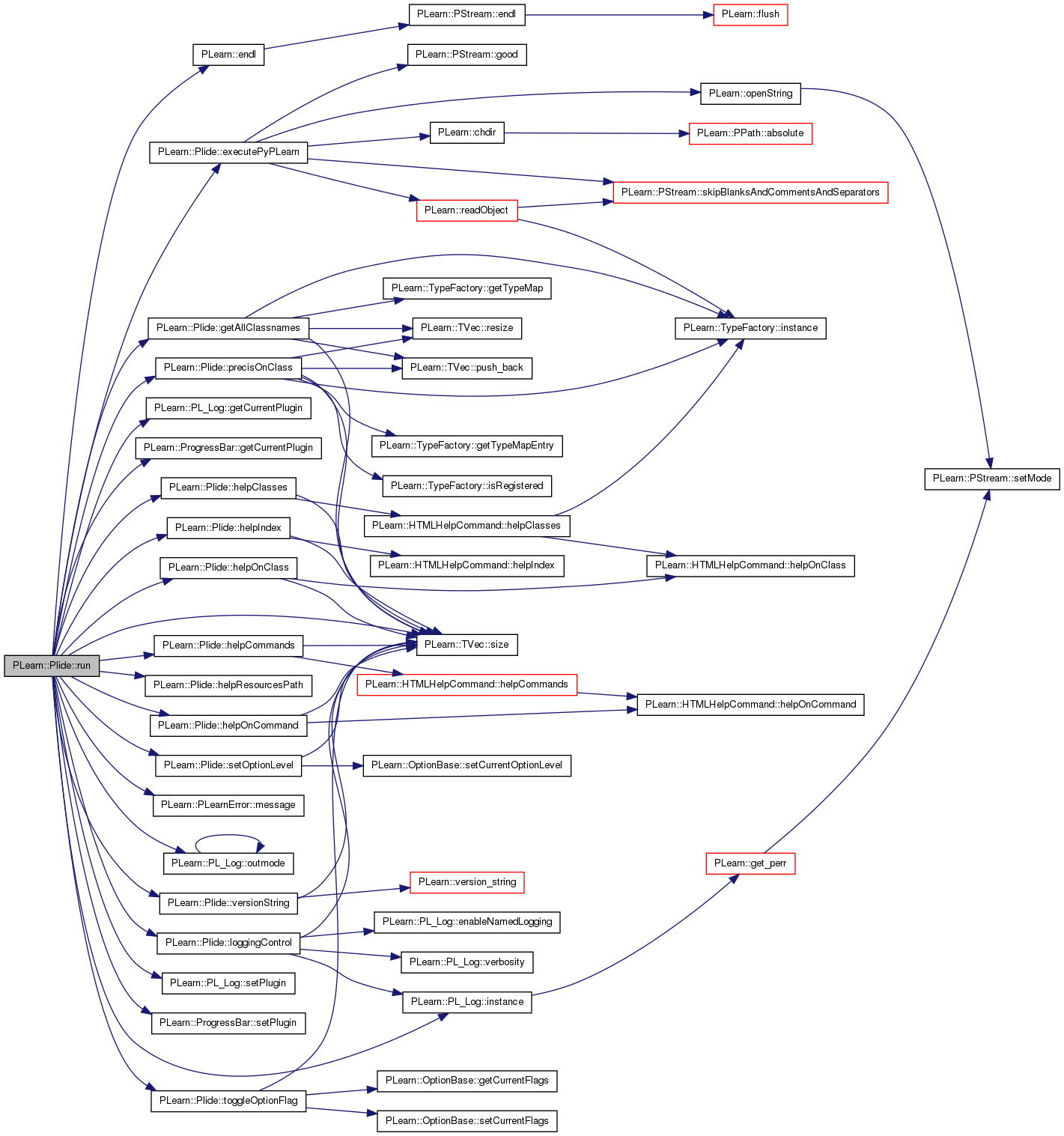
| PythonObjectWrapper PLearn::Plide::setOptionLevel | ( | const TVec< PythonObjectWrapper > & | args | ) | const |
Option level for class help.
Definition at line 432 of file Plide.cc.
References PLERROR, PLearn::OptionBase::setCurrentOptionLevel(), and PLearn::TVec< T >::size().
Referenced by run().
{
if (args.size() != 1)
PLERROR("%sExpecting 1 argument; got %d", __FUNCTION__, args.size());
OptionBase::OptionLevel desired_level = args[0].as<OptionBase::OptionLevel>();
OptionBase::setCurrentOptionLevel(desired_level);
return PythonObjectWrapper();
}


| PythonObjectWrapper PLearn::Plide::toggleOptionFlag | ( | const TVec< PythonObjectWrapper > & | args | ) | const |
Toggle flags to display for class help.
Definition at line 441 of file Plide.cc.
References PLearn::OptionBase::getCurrentFlags(), PLERROR, PLearn::OptionBase::setCurrentFlags(), and PLearn::TVec< T >::size().
Referenced by run().
{
if (args.size() != 1)
PLERROR("%sExpecting 1 argument; got %d", __FUNCTION__, args.size());
OptionBase::flag_t flag_to_toggle = args[0].as<OptionBase::flag_t>();
OptionBase::setCurrentFlags(OptionBase::getCurrentFlags() ^ flag_to_toggle);
return PythonObjectWrapper();
}


| PythonObjectWrapper PLearn::Plide::versionString | ( | const TVec< PythonObjectWrapper > & | args | ) | const |
PLearn version string.
Definition at line 330 of file Plide.cc.
References PLERROR, PLearn::TVec< T >::size(), and PLearn::version_string().
Referenced by run().
{
if (args.size() != 0)
PLERROR("%sExpecting 0 argument; got %d", __FUNCTION__, args.size());
return PythonObjectWrapper(version_string());
}


HTML generator for the Help system (points to the systemwide command instance)
Definition at line 126 of file Plide.h.
Referenced by helpClasses(), helpCommands(), helpIndex(), helpOnClass(), and helpOnCommand().
Configuration object for the HTML Help system.
Definition at line 129 of file Plide.h.
Referenced by helpClasses(), helpCommands(), helpIndex(), helpOnClass(), and helpOnCommand().
PLearnCommandRegistry PLearn::Plide::reg_ [static, protected] |
 1.7.4
1.7.4